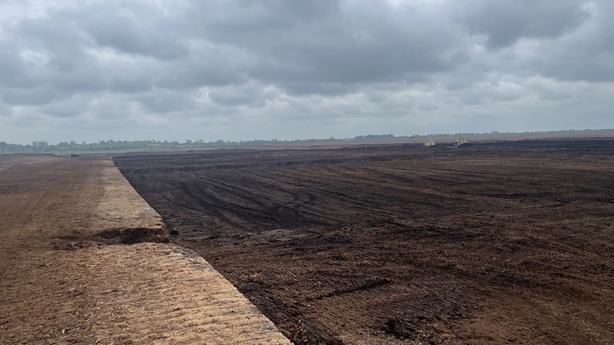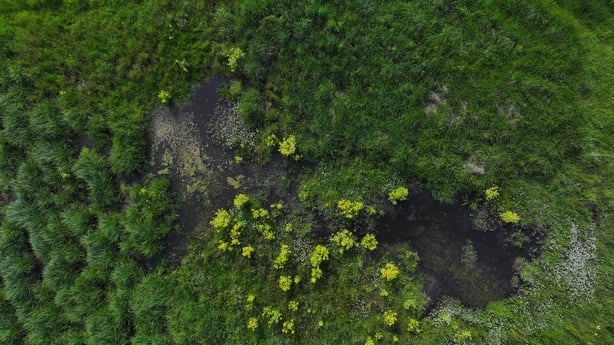For months now the proposals for the Nature Restoration Law have provoked heated debate and exchanges between farming organisations and environmental and other NGOs.
This week's narrow majority vote for the watered-down version of the law in the European Parliament was greeted with mixed reactions on all sides.
The text passed has removed all mention of rewetting, and other measures targetted at the agri sector.
Nevertheless farming organisations remain wary of the law and what it will mean for them.
IFA President Tim Cullinan was in Brussels for the vote.

"There is real and genuine concern that there will be significant ramifications from passing this law in this format," Mr Cullinan said.
"There is still a lot of ambiguity around what the law will mean and with no impact assessments undertaken at Member State level the impact on farm incomes, food production and farming practices is unclear.
"The debate became about whether people are for or against nature, which is a misrepresentation of the situation. The detail of the proposed 'law’ is the issue."
ICMSA
Speaking from Irish Creamery Milk Suppliers Association headquarters in Limerick, association President Pat McCormack said that ultimately, they have been left unhappy.
"We knew it was going to be a tight vote and we're disappointed it has gone through in the way that it has without the critical word 'voluntary' being included in the text," he said.
"Farm families work with nature on a daily basis and we don't want to be taken for granted.
"There needs to be incentives and rewards for farmers that take part in nature restoration work."
Cattle and sheep farmers
The Irish Cattle and Sheep Farmers Association welcomed the scrapping of the proposals to rewet agricultural peatlands in the final text that passed in the European Parliament.
President Dermot Kelleher said the decision to scrap Article Nine, which concerns the contentious issue, was a victory for common sense and illustrates the need for more rounded debate.
"The latest research from Teagasc indicates that emissions from Irish peatlands have been spectacularly overestimated," Mr Kelleher said.
"It would be a travesty to rewet lands - and destroy the value of that land - based on figures that were wrong."
Mr Kelleher also welcomed the removal of Article 16 from the final proposal agreed at the parliament vote.
"Article 16 would have provided for the possibility for citizens’ groups and environmental NGOs to take legal action against Member States for any perceived failure to implement national restoration plans," he added.
"The removal of this article was something that ICSA lobbied hard for as it essentially would have provided a charter for constant legal battles.
"It would have served no purpose other than to create massive division and polarise positions.
"The Nature Restoration Law will now move to the trilogues phase of negotiations between the three institutions of the EU – the Commission, the Council of Ministers, and the Parliament.
"There are no guarantees that amendments made by the Parliament today will survive the trilogue negotiations so there is still much work to be done to ensure our farmers are safeguarded.
"ICSA also has grounds to remain very concerned about farmers on Natura land as in Article Four it is stated that nature restoration is to be done on Natura 2000 areas and not on the whole EU territory."

For hill farmers and those farming in environmentally sensitive areas, Vincent Roddy of the Irish Natura and Hill Farmers Association said they have major concerns.
"Beyond the rewetting that got a lot of focus in the debate, we have always had concerns that this law would have major implications for farmers on hill land, and definitely Article 4 reinforces that because what they are looking at here is the reinstatement of habitats, and Annex 1 habitats are the type of land a lot of farmers have," Mr Roddy said.
"A lot of our farmers are quite nervous around that idea, and we have seen suggestions that sheep should have no place on our hills and we would see the law as a means of delivering this."
Environmental NGOs
For their part, environmental NGOs also have mixed feeling about the text of the law that was narrowly passed this week.
The Environmental Pillar said that many important sections of the law have been deleted, including the entire section that relates to improving biodiversity within farmland and forestry.
This section also contained the rewetting targets for peat soils which have been subject to "intense lobbying and misinformation" from some within the agricultural lobby.

Dr Elaine McGoff is Head of Advocacy with An Taisce. She said the original ambition of the law has been weakened.
"While Europe will now have a Nature Restoration Law, as a result of the amendments proposed by certain groups the original ambition has been significantly weakened," Dr McGoff said.
"The Irish Government now has a key role to play in the negotiations between the Council and the Parliament to bolster the ambition of the law, in line with the wishes of the vast majority of Irish people."
Head of Advocacy at BirdWatch Ireland Oonagh Duggan said recent headlines "have been filled with record breaking global temperatures, extreme flooding events and fears about crop yields".
"We welcome that the European Parliament voted to keep alive the proposed Nature Restoration Law, at the same time it has been weakened significantly," she said.
"This law would help us all mitigate and adapt to climate breakdown and especially farmers producing our food."
Following this week's vote, the European Parliament, the European Commission and the European Council all have a position on the Nature Restoration Law, and trialogue negotiations between the three will soon get under way to hammer out the final details of the law that will be implemented in Members States.






